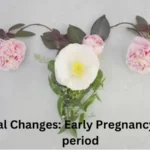
In this article, you will read about early pregnancy symptoms and the changes that occur during pregnancy. Waiting for a child is always a magical moment for all women. But before the arrival of this happy event, the body of the future mother undergoes many changes. Yes, it is not only the belly that rounds. The changes affect almost the entire body. Fortunately, these changes are just temporary, and everything becomes normal after the baby is born. So what are early pregnancy symptoms?
What Are Early Pregnancy Symptoms?
Below is a list of early pregnancy symptoms that might help you know you’re pregnant even before you’ve taken the pregnancy test. So here’s what we have.
Delayed or Late Period
This is the most common pregnancy symptom, and not only in the movies, where a woman notices that she missed her period and runs to buy a pregnancy test. There can be other explanations for this, of course, such as excessive weight gain or loss, hormonal problems, tension, ceasing to take the pill or changing to a different pill, and more.
Related: Fibroids During Pregnancy – Full Guide
Morning Sickness
Another well-known pregnancy symptom. Many women feel nausea between 2-8 weeks of pregnancy. There are some lucky women who hardly experience nausea, but some suffer from it throughout most of their pregnancy. There might be other explanations for your nausea, such as a simple food poisoning, but if it tends to show up in the morning, better buy that pregnancy test.
Related: Is Morning Sickness a Good Sign of Pregnancy?
Weight Gain
Weight gain is without a doubt one of the most noticeable body modifications that pregnant women experience during pregnancy. But it varies from woman to woman. In the course of the first 3 months of pregnancy, this weight gain is quite low because of vomiting and morning sickness. Weight gain accelerates as the pregnancy progresses.
During the second trimester, the desire to eat increases. If you have food cravings, there is no need to deprive yourself. You just need to eat a balanced diet while limiting your sugar consumption. By the end of the second quarter, you will have gained about six pounds more.
At the start of the 3rd trimester, the monthly weight gain is about 1 to 1.5 kg, which makes a total weight gain of 9 to 12 kg before delivery. Note that during the last weeks of pregnancy, it is advisable to be vigilant since inactivity stimulates appetite and weight gain can be surprising.
Related: How Much Weight Should I Gain In Pregnancy?
Swollen or Tender Breasts
Breast swelling is part of the changes caused by pregnancy. Your breasts might feel swollen, sore or tender as of 1-2 weeks of pregnancy. Under the influx of hormones, the breasts grow and become sensitive to pain. The veins darken, and the breast-level blood flow increases. The nipples, as well as the areolae, also suffer the same effect when the hormones affect the pigmentation of the skin. A yellowish substance called colostrum will start to appear during pregnancy.
Tip
Try to limit the weight of your chest, wear a well-fitting bra with a broad hat and wide straps. If it’s excruciating, wear your bra at night too. To improve the tone of the skin, take showers with fresh water. Massage is another option. Hands laid flat, perform light massages up the nipple to the shoulder.
Related: Top 1000 Spanish Baby Boy Names with Meaning – 2023
Related: Top 1000 Spanish Baby Girl Names with Meaning – 2023
Headaches

Headaches are a possible symptom, due to the sudden rise of hormones in your body. However, any woman who suffers from chronic headaches or migraines should probably not count on that symptom.
Related: Say Goodbye to Pregnancy Headaches
Fatigue
Extreme tiredness or sleepiness are common early pregnancy symptoms. If you’re pregnant, you might feel more tired than usual as early as the first week after conception. Of course, it also might be that you’re just tired or caught the flu.
Related: Top 1000 Indian Baby Boy Names with Meaning – 2023
Related: Top 1000 Indian Baby Girl Names with Meaning – 2023
Implantation Bleeding
One of the earliest pregnancy symptoms can be implantation bleeding. It might happen about 6-12 days after conception, when the embryo implants itself into the uterine wall. Some women will experience light bleeding as well as some cramping. It usually lasts from one to three days; very rarely for five days. The color of the bleeding usually ranges from pink to brown. In rare cases, it can also be black, but only rarely red. Unlike in menstruation, you’re not supposed to see any clots. However, this is where you should track your cycle, because it might be that you’re experiencing actual menstruation. Changing your pill ,abrasion from sex and infection might cause spotting as well.
Related: Top 1000 US Baby Boy Names – 2023
Related: Top 1000 US Baby Girl Names – 2023
Backaches
The back is the part of the body that pays the highest price during pregnancy. The extra pounds are not the only ones responsible. The center of gravity moves forward, and suddenly, the back is hollow. Some experience lower backaches early in pregnancy, and even throughout the whole pregnancy as well.
Tip
If you work while sitting, take the right posture, don’t cross your legs, and don’t stay for hours without moving. If you work standing up, wear comfortable shoes and sit down regularly.
Varicose Veins
Varicose veins are large bluish veins which often show on the thighs and legs in pregnancy period. This occurs mainly because the body perks up the extra blood circulation that goes into your baby. Varicose veins may at times make you feel awkward. Sad to say, should there be a trace of varicose veins in your household, there is undoubtedly a high tendency of getting them in the course of your pregnancy.
Increased Thirst and Frequent Urination

Now this is a symptom that is easy to miss, and although many women experience it around 6-8 weeks after conception, they don’t realize the reason for it. What’s happening is that in early pregnancy your blood volume increases, which can cause frequent urination but can also make one feel thirsty. Of course, it also might be that you drink a lot, or suffer from a urinary tract infection or diabetes, but if you don’t, it might be the time to check if you’re pregnant.
Darkening Areolas
In early pregnancy, the skin around your nipples may get darker. During the pregnancy and after you give birth, you may notice additional changes: Darker color can progress throughout the pregnancy, the areola diameter may increase (it differs from one woman to another). Montgomery glands become larger, the skin of the areola and nipples gets thicker, the nipple gets bigger, and the whole breast may enlarge as well.
Your body is preparing itself for breastfeeding the future baby. You can expect the areola to return to its pre-pregnancy size after you quit breastfeeding, but it’s not always so. The color of the areola may lighten, but it isn’t likely to become as light as it was before becoming pregnant. The shape of the breast may change as well.
Pimple Eruptions and Acne
If you already have an acne problem, it could become even more irritating during pregnancy. The extra hormones produced by your body cause your oil glands to secrete more oil, which can cause pimple breakouts.
Tip
Cleanse your face every night and every morning. Avoid washing your face more frequently, it could make your skin dry. Then use an astringent to remove any remaining oil. Avoid using any astringent designed to cure acne; they may contain acne medications that are not prescribed for pregnant women. Finally, follow this procedure with an oil-free moisturizer. If you find that you are having acne problems, consult your health care provider about treating acne during pregnancy.
Dry and Itchy Belly Skin
As the abdomen grows, your skin becomes more tight, which causes a very scratchy dryness and itching on your skin. If you experience severe itching later in your pregnancy, possibly with nausea, vomiting, loss of appetite, fatigue, and jaundice, you should contact your doctor.
This could be a sign of cholestasis, which is related to the functioning of the liver. Your doctor can perform blood tests to see if you have cholestasis. Cholestasis occurs in about 1 of every 50 pregnancies and is not a problem after pregnancy.
Pregnancy Mask
The “pregnancy mask” is also called melasma and chloasma. Melasma causes dark splatter spots on your face. These spots appear most often on your forehead and cheeks and are a result of an increase in pigmentation. Nearly 50% of pregnant women have signs of a “pregnancy mask.”
Tip
Vitamin B is known for reducing the pregnancy mask. Some dermatologists prescribe a depigmenting ointment to apply to larger spots. Avoid alcoholic tonic lotions, and do not expose yourself to the sun.
Related: How is Melasma Treated During Pregnancy?
Shiny Hair
During the pregnancy period, the hair of future mothers also changes. They become more beautiful and shinier. All this is caused by the different hormones secreted by the body. During pregnancy, the amount of sebum can also decrease, making hair less oily.
Some pregnant women, on the other hand, have hair that is fatter because of the increase in the amount of sebum. By adopting a balanced diet, you can limit the fall of your hair if this is your problem.
Related: How Your Hair is Different During Pregnancy?
Food Cravings or Aversions
Many women crave for certain foods when they are pregnant. Others don’t. Some won’t eat anything but bread because other food makes them sick, and some lose their appetite for meat. This can last throughout the entire pregnancy. As so many other things in pregnancy, this is strictly individual. Then again, it might be that you’re craving for a certain dish just because your body lacks a certain nutrient, or you’re just stressed.
Related: When Do Pregnancy Cravings Start?
Bloating
Like other symptoms in early pregnancy, bloating is caused by hormonal changes. As your progesterone and estrogen levels rise, the lining of your uterus thickens, making you feel more bloated. Hormonal changes can also cause your digestive system to slow down, which can cause bloating as well. It may be hard to tell the difference between premenstrual bloating and pregnancy bloating, for early pregnancy symptoms and PMS symptoms are often similar. However, pregnancy symptoms are often more exaggerated.
Constipation or Diarrhea

In the previous paragraph, we mentioned that hormonal changes in early pregnancy can cause your digestive system to slow down. In addition to bloating, this can cause constipation. Taking iron, which is often prescribed to pregnant women, can add to the problem. Try adding more fiber to your diet and drink more fluids. Hormones sometimes affect women differently, though. While most women will have issues with constipation during early pregnancy, some will have diarrhea instead. As already said – each woman has her reaction.
Related: 10 Tips to Firm Your Vagina and Keep it Tight
Vaginal Discharge
Typically, around ovulation, women will have an increase in cervical mucus. After ovulation, cervical mucus dries up and generally stays dry through the remainder of her cycle. In pregnancy, estrogen levels increase which may cause a woman to secrete more cervical fluid, usually described as creamy, lotion like, or yellowish. However, bear in mind that normal estrogen changes can also cause vaginal discharge.
Related: Bleeding During Pregnancy: What’s Normal and What’s Not
Mood Swings
Women are famous for their PMS mood swings. The bad news is, that during early pregnancy, some women experience similar symptoms. It’s more tears than breaking plates, though, so warn your husband to get the tissue-box ready!
Other possible symptoms of early pregnancy may be heightened sense of smell (possibly due to the increase in estrogen levels) and cramping, though it can easily be mistaken for PMS or menstrual cramps. You might notice it as your embryo implants into your uterus.
Related: Mood Swings During Pregnancy
How soon after Conception can Pregnancy Symptoms start?
The early pregnancy symptoms can start as early as one week after conception, although it varies from person to person. Here are some key points:
- Some people start to notice changes within a week after conception, while others might not notice anything until they miss their period.
- Fatigue can set in as soon as one week after conception due to sudden changes in hormone levels, particularly increasing progesterone.
- Increased urination can be a sign of pregnancy and may occur around the time your next period is due.
- Morning sickness, including food aversion, nausea, and vomiting, can set in as early as two weeks after conception.
- Light spotting, known as implantation bleeding, can occur around six to 12 days after fertilization.
- Breast tenderness and changes, such as swelling and tingling, may be experienced as early as 1-2 weeks after conception.
When should I take a Pregnancy Test?
To get the most accurate results, it’s best to take a pregnancy test at least one week after your first missed period. However, some tests can detect pregnancy as early as six days before the missed period. If you’re unsure when your next period is due, wait at least 21 days after you last had unprotected sex before taking the test. Remember to carefully read the instructions that come with the test and check the expiration date on the package. If you suspect you might be pregnant, it’s important to take a test as soon as possible and consult with a healthcare professional for accurate diagnosis and guidance.
When should I make a Doctor’s Appointment?
If you suspect that you might be pregnant or have any health concerns related to pregnancy, it is advisable to schedule a doctor’s appointment as soon as possible. Here are some situations when you should make a doctor’s appointment:
- Positive Pregnancy Test: If you have taken a home pregnancy test and it comes out positive, it’s a good idea to schedule an appointment with a healthcare provider. They can confirm the pregnancy and provide guidance on prenatal care.
- Missed Period and Pregnancy Symptoms: If you have missed your period and are experiencing early pregnancy symptoms like morning sickness, breast tenderness, fatigue, etc., it’s essential to see a doctor for confirmation and to discuss the next steps.
- Unusual Symptoms: If you experience any unusual or concerning symptoms during pregnancy, such as severe abdominal pain, heavy bleeding, dizziness, or high fever, seek medical attention promptly.
- History of Pregnancy Complications: If you have a history of pregnancy complications or medical conditions that could impact your pregnancy, it’s crucial to consult with a healthcare professional early on to manage any potential risks.
- Family Planning and Preconception Care: If you are planning to conceive and want to ensure a healthy pregnancy, consider scheduling a preconception appointment. Your doctor can provide personalized advice on nutrition, lifestyle changes, and prenatal supplements.
- Health Concerns or Medication Usage: If you have any existing health conditions or are taking medications, it’s essential to discuss these with your healthcare provider to ensure they are compatible with pregnancy.
- General Check-Up: If you are unsure about your pregnancy status but have concerns about your reproductive health or overall well-being, a general check-up with your doctor can provide valuable insights.
Conclusion
In conclusion, symptoms of pregnancy in the body during pregnancy remain inevitable, regardless of the progress of science or medicine. Remember, none of the symptoms (except maybe nausea) is 100% reliable. Many of them, such as breast tenderness, backaches and cramping, are common PMS symptoms. A blood test will always give you the answer, and most of the home pregnancy tests are reliable as well, though the tests’ sensitivity level varies. Despite the ills and discomforts that can occur, pregnancy is a magical time, and you only have to enjoy it.
Related: What are the Miscarriage Symptoms?
Frequently Asked Questions (FAQs)
Can I experience pregnancy symptoms before a missed period?
Yes, some women may notice early signs of pregnancy even before a missed period. These symptoms can include light spotting, cramping, and breast tenderness.
How soon can I take a pregnancy test after experiencing symptoms?
You can take a home pregnancy test as early as a few days after you’ve missed your period. However, for accurate results, it’s best to wait at least a week after your missed period.
Are all women’s experiences the same during early pregnancy?
No, every woman’s body is unique, and the way pregnancy symptoms manifest can vary. Some may experience multiple symptoms, while others may have only a few or none at all.
Are cramps during early pregnancy normal?
Mild cramping during early pregnancy is generally considered normal as the uterus expands and the ligaments stretch to accommodate the growing embryo. However, severe cramps should be evaluated by a healthcare provider.




